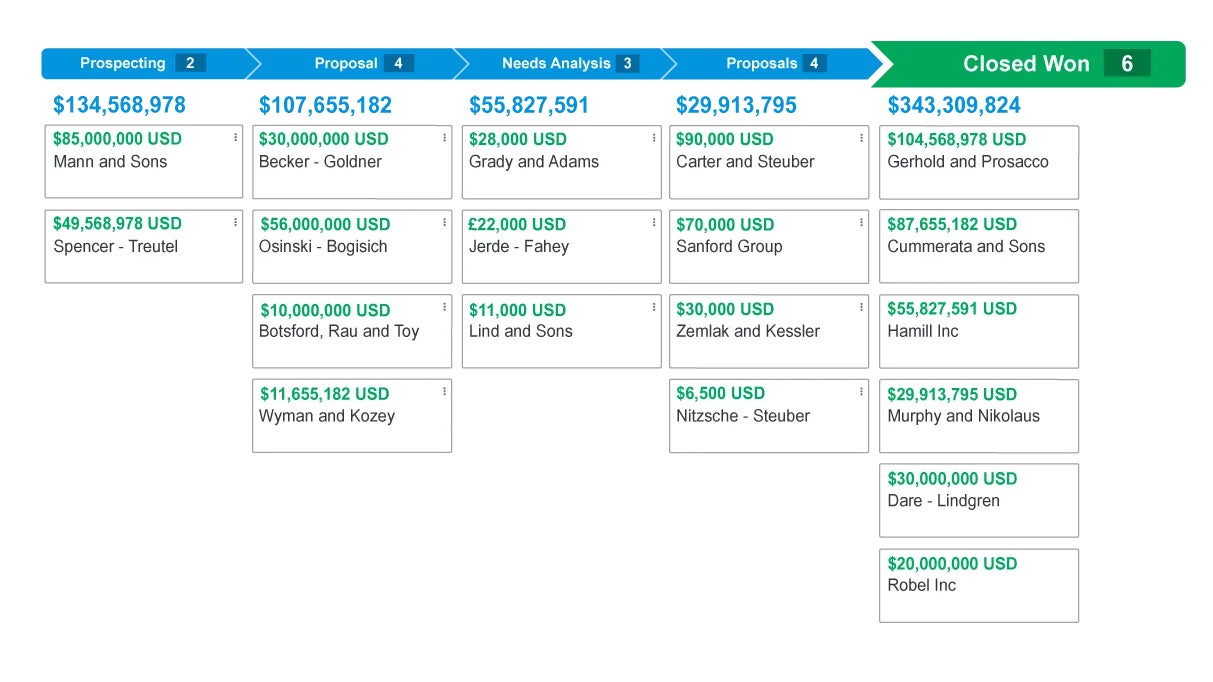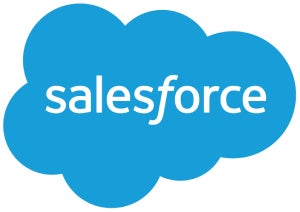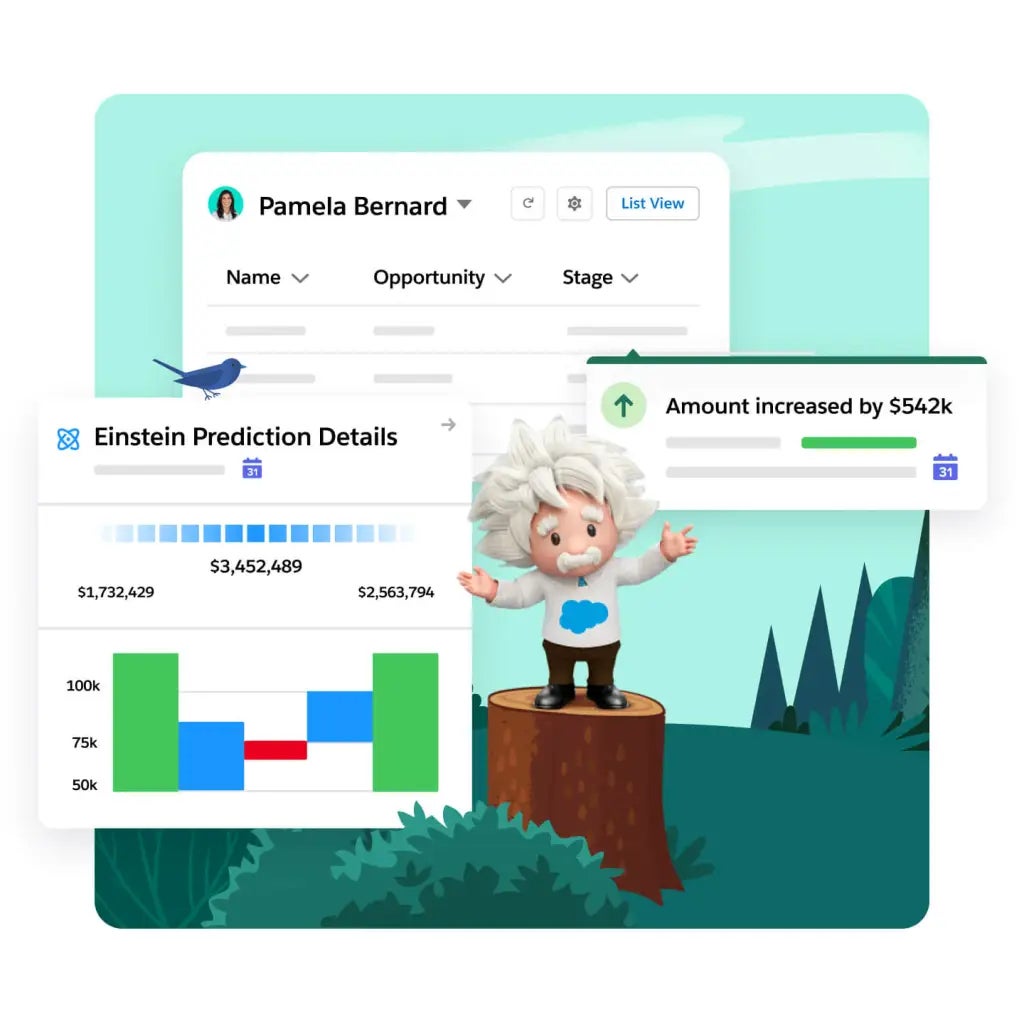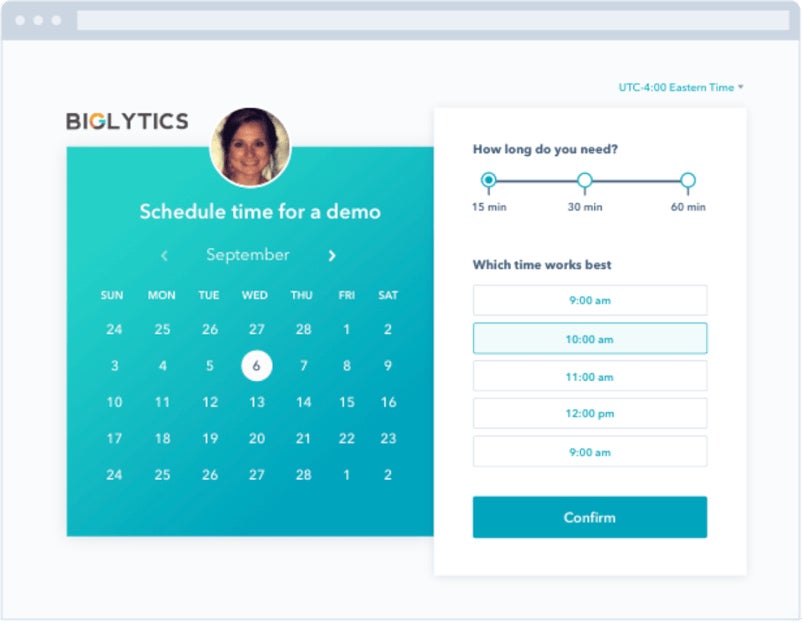- Best CRM for collaboration across departments: Freshsales
- Best for social media and online marketing: Zoho CRM
- Best CRM offering visual pipelines: Pipedrive
- Best CRM provider for project management: Insightly
- Best CRM for enterprise sales teams: Salesforce
- Best CRM offering a robust free version: HubSpot
Enterprise CRM software are customer relationship management platforms specifically designed for mid-large organizations. With the right software, businesses can automate a series of sales and marketing related tasks, such as deal tracking, client engagement and team management.
These providers organize and track current and past client activity through custom workflows and pipelines with advanced tech features and AI tools. They’re meant to help teams, departments and entire enterprises access the same up-to-date information through visually digestible dashboards.
Top enterprise CRM software comparison
The top general enterprise CRM software offer a variety of core features, like contact and account management, basic reports and dashboards and activity tracking. After building pipelines and reports in the software, information and activity updates can be shared through the CRM’s integration functionality with other applications, both native or third-party. This way, there is visibility to accounts and pipelines across teams and entire departments.
| Software | |||||
|---|---|---|---|---|---|
| Freshsales | |||||
| Zoho CRM | |||||
| Pipedrive | |||||
| Insightly | |||||
| Salesforce | |||||
| HubSpot |
Freshsales: Best CRM for collaboration across departments
Our score: 4.3/5

Freshsales allows teams and entire departments to collaborate and communicate from one dashboard through AI-powered tools (Figure A). The task management tools and multiple dashboard views allow universal access to the same up-to-date information, just organized in department-specific ways. Even in the free tier, you can assign tasks and project deadlines while tracking individual and team progress.

Pricing
- Free CRM: Free for up to 3 users and offers email templates, a sales dashboard and more.
- Growth: $15 per user per month, billed annually, or $18 per user when billed monthly.
- Pro: $39 per user per month, billed annually, or $47 per user when billed monthly.
- Enterprise: $69 per user per month, billed annually, or $83 per user when billed monthly.
Features
- Freddy AI: AI-powered assistance who helps find potential clients, draft emails and provide insights.
- Custom dashboard: Plan and organize an entire sales process with drag-and-drop cards.
- Reporting: View graphical reports and simple dashboard to easily understand business metrics.
Pros
- 21-day free trial.
- Robust AI-powered tools.
- Built-in phone, chat and SMS features.
Cons
- Capped integration with Google.
- Only 6 reports per dashboard.
- No workflows offered in the free version.
Pipedrive: Best CRM offering visual pipelines
Our score: 4.3/5

Pipedrive offers a highly visual drag-and-drop interface, making it great for reflecting sales and marketing processes. Creating these kanban-like pipelines makes it easier to manage new leads and existing clients from one place. Pipedrive is an intuitive software for individuals to navigate and identify potential sales opportunities (Figure C).

Pricing
- Essential: $14.90 per user per month, billed annually, or $21.90 per user when billed monthly.
- Advanced: $27.90 per user per month, billed annually, or $37.90 per user when billed monthly.
- Professional: $49.90 per user per month, billed annually, or $59.90 per user when billed monthly.
- Power: $64.90 per user per month, billed annually, or $74.90 per user when billed monthly.
- Enterprise: $99.00 per user per month, billed annually, or $119 per user when billed monthly.
Features
- AI sales assistant: Analyze past sales activity and generate performance forecasting with AI.
- Email inbox: Integrate existing email provider to send and receive messages directly in the CRM, plus email and click tracking.
- Document management: Access Smart Docs through the higher paid tiers or select it as an add-on to send and track quotes or proposals.
Pros
- 14-day free trial.
- 24/7 support.
- Affordable paid tiers.
Cons
- No free-for-life option.
- Limited marketing tools.
- Limited lead segmentation for sales.
SEE: Explore a more in-depth comparison of Pipedrive and HubSpot.
Insightly: Best CRM provider for project management
Our score: 4.3/5

Insightly offers robust project management functionality through a modern cloud-based software. Sales features like project pipelines, integrations with productivity apps and milestone tracking make it easy to monitor the full sales cycle (Figure D). So once opportunities are identified and then converted into projects, enter and track post-sale activities from the same pipeline.

Pricing
- Free CRM: Free for up to two users and 2,500 records.
- Plus: $29 per user per month, billed annually.
- Professional: $49 per user per month, billed annually.
- Enterprise: $99 per user per month, billed annually.
Features
- Lead management: Capture and score new and existing leads by housing details with set criteria.
- Opportunity management: Build custom pipelines with reporting creatures to get insight into what’s driving the business forward and identify potential risks.
- Process automation: Reduce redundant tasks and scale faster with emails, reminders and onboarding stages.
Pros
- Over 1,000 app integrations available.
- Offers monthly billing.
- 14-day free trial.
Cons
- User support cost extra.
- Doesn’t offer certification programs.
- Only access community forums with premium plans.
Salesforce: Best CRM for enterprise sales teams

Our score: 4/5
Salesforce offers extensive data features to help organizations make calculated decisions when it comes to their sales process. Create a variety of custom CRM reports that display analytics and real-and time sales forecasts (Figure E). The external and internal communication tools and sales activity tracking make it a great option for organizations with complex sales processes.

Pricing
- Starter Suite: $25 per user per month, billed annually.
- Professional: $80 per user per month, billed annually.
- Enterprise: $165 per user per month, billed annually.
- Unlimited: $330 per user per month, billed annually.
- Unlimited+: $500 per user per month, billed annually.
Features
- Application integrations: Sync the CRM with over 7,000+ apps such as Mailchimp, DocuSign and Slack.
- Mobile app: Access the dashboard, contact profiles and offline data data offline with the Salesforce free mobile app for IOS and android.
- Lead scoring: Capture inbound leads from the organization’s website and automatically have them scored based on demographics or behaviors.
Pros
- 30-day free trial.
- 7,000+ app integrations.
- 24/7 chat support.
Cons
- No free-for-life option.
- Most expensive option.
- Users have reported slow support.
SEE: For more information, check out our full Salesforce review.
HubSpot: Best CRM offering a robust free version
Our score: 3.9/5

HubSpot’s robust free version offers up to 2,500 users a variety of sales and marketing tools. Organize and engage with clients through the dialer, live chat and email tools and manage activity within a custom dashboard (Figure F). Sync this information across an array of third-party integrations. If you’re new to implementing a CRM into a business or want to deploy an easy-to-use CRM across an organization, HubSpot is a good choice.

Pricing
- Free CRM: Free for up to 2,500 users.
- Starter: $20 per 2 users per month, billed annually, or $30 when billed monthly.
- Professional: $1,600 per 5 users per month, billed annually, or $1781 when billed monthly.
- Enterprise: $5,000 per 10 users per month, with an annual commitment.
Features
- Contact management: Integrate with Gmail or Outlook for inbox insights and automatic list segmentation.
- CRM reporting: View report types like deals created, monthly revenue, website traffic and social media interactions.
- Email marketing: Schedule emails with customized templates, track activity and opened messages and more.
Pros
- Offers a variety of free tools.
- 24/7 email and chat support.
- Intuitive user interface.
Cons
- Costly higher support tiers.
- No free trial.
- Add-ons start at $25 per month.
SEE: Explore a more in-depth comparison of Salesforce and HubSpot.
How do I choose the best enterprise CRM software for my business?
This list we’ve created includes the top general enterprise CRM providers in the market, but now you need to narrow them down to find the software that best fits your business goals and budget. Next, consider requesting quotes or demos from the providers that peak your interest, or sign up for the free versions. This way, you can begin communicating directly with the provider’s sales team and start implementing the software into your existing customer management process.
Below are sample questions to consider asking when researching CRM software:
- What is the total in-market expertise for your industry?
- Is the CRM scalable and detailed enough to fit your business size?
- Are their services within your budget?
- Does the CRM offer the core features you need, such as list segmentation or a mobile app?
- Does the CRM software integrate with tools you already have in your tech stack?
DOWNLOAD: Get a deeper understanding of how CRM can help small businesses grow.
Review methodology
We scored each provider against a rubric with outlined criteria and subcategories of CRM industry standards. Using that rubric and an in-house algorithm to calculate an overall star rating, we assigned each CRM software an ideal use case. Here is a breakdown of the scoring criteria we followed:
- Cost: Weighted 25% of the total score.
- Core features: Weighted 25% of the total score.
- Customizations: Weighted 15% of the total score.
- Integrations: Weighted 15% of the total score.
- Ease of use: Weighted 10% of the total score.
- Customer support: Weighted 10% of the total score.

